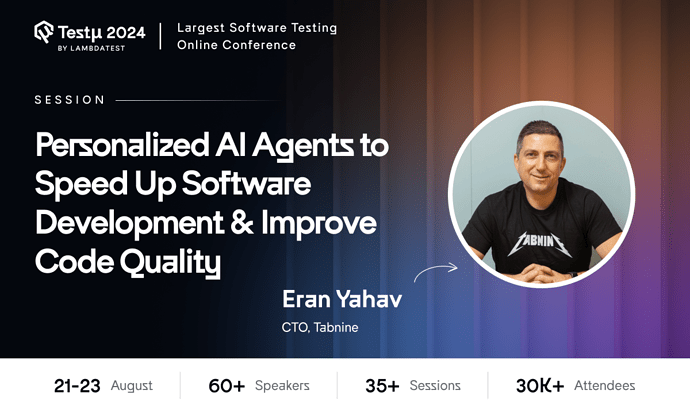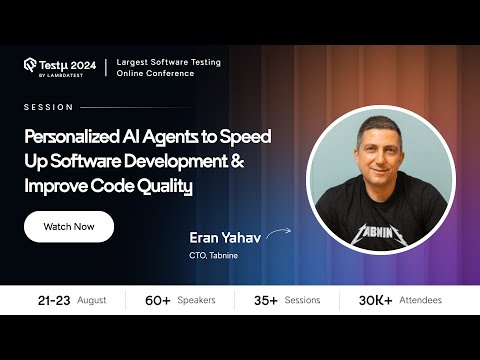AI code assistants are integral to modern development, but their benefits vary. Learn how to enhance their effectiveness by making them more relevant to your needs.
Join Eran Yahav to discover how Retrieval-Augmented Generation (RAG) boosts AI output by integrating external data and how leveraging your existing codebase can improve AI suggestions. Gain practical advice on customizing AI tools to align with your organization’s standards for better performance. Join us to optimize AI in your development process and achieve better code quality.
Still not registered? Register Now!
Already registered? Share your questions in the thread below 
Hi there,
If you couldn’t catch the session live, don’t worry! You can watch the recording here:
Additionally, we’ve got you covered with a detailed session blog:
Here are the Some Unanswered Question of the Session
What specific tasks in the software testing lifecycle can be most effectively handled by personalized AI agents to reduce time and improve accuracy?
What are the potential risks of relying on AI agents for code generation and how can they be mitigated?
Can agentless AI solutions be as effective with accelerating software development and enhancing code quality? Or are there compromises in personalization or efficacy?
Is there any consideration for running small batch full lifecycle for any given request using a many agents approach? Also, to smooth the communication of desired changes is there any studies of spoken conversation for requirement communication
Can we use ai agents to automatically write integration test cases by providing source code of application?
What are the key factors to consider when selecting an AI agent for improving code quality?
Can AI agents assist in automating complex test scenarios or edge cases that are difficult to cover with traditional testing methods?
What % of project time do you allocate / add for the training / onboarding of the AI in the SDLC process and how often is it “retrained / improved / adjusted”?
How can AI testing agents such as Tabnine’s validate the correctness of their generated tests?
How would we transition to be an effective AI engineer for AI agents?
The infrastructure & deploy pipelines of software and software hosting AI/ML is same, doesn’t it mean, one has to monitor, scale and configure it manually… <<Question cont. in chat. Please have a look, if possible>>
Can you explain a bit about the onboarding process for the AI agent?
How do you find a good balance between the reliability (accuracy) and speed (latency) of the tests?
Does Tabnine only work in my IDE or can it also review my commits on GitHub & Co.?
Relying on AI for code generation introduces several risks:
-
Accuracy: AI-generated code might not always meet business logic or domain-specific needs.
-
Security: AI agents could inadvertently introduce vulnerabilities.
-
Code Quality: The generated code may lack readability or maintainability.
To mitigate these risks, incorporate human oversight at critical review points, especially during code validation. Use AI as a tool to assist, but not as a sole solution. Implement robust testing strategies and regularly audit the AI’s output for accuracy and security.
Agentless AI solutions can still be effective in accelerating development by offering easier deployment and maintenance, especially for CI/CD pipelines. However, the compromise lies in personalization. Without agents, AI might not fully integrate with specific environments or custom workflows, limiting its ability to offer tailored solutions for complex, project-specific challenges. It’s a trade-off between simplicity and customization.
When selecting an AI agent for improving code quality, consider:
-
Code Coverage: Can the agent analyze and cover various aspects of the code, including edge cases and security?
-
Integration: How well does it integrate with your existing CI/CD and development pipeline?
-
Learning Ability: Can the AI learn from your specific environment, including code patterns and architecture?
-
Human Oversight: Does the agent provide explainable AI (XAI) features that allow developers to understand its decisions?
Yes, AI agents excel at identifying and automating complex test scenarios or edge cases that may be missed by traditional rule-based testing. Machine learning models can identify hidden patterns and behaviors in the application that may not be immediately obvious, helping to cover areas that are often overlooked.
![]()

